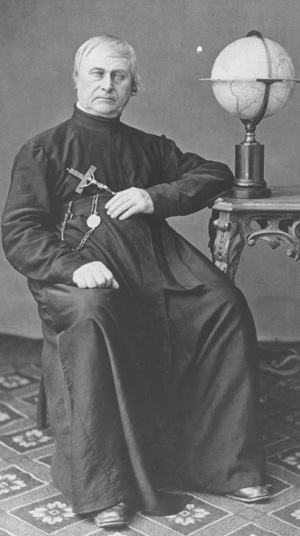DE SMET, PIERRE-JEAN (1801-1873)

Pierre-Jean De Smet, ca. 1864
View largerAs a missionary to the West, Pierre-Jean De Smet, S.J., had no equal among nineteenthcentury Catholics. Born on January 30, 1801, to a wealthy family in East Flanders (Belgium), De Smet journeyed to America in 1821 to join the Society of Jesus, or Jesuits, an order of Catholic men with a special interest in missions and education. Following more than a decade of religious formation, De Smet began his missionary career in 1838 when he established Saint Joseph's Mission for members of the Potawatomi tribe at Council Bluffs. From that date until his death, De Smet baptized many thousands of Native Americans in more than thirty tribes. He traveled some 180,000 miles, including seventeen trips across the Atlantic Ocean, in his efforts to educate others about the spiritual condition of Native Americans, and he ultimately raised more than a half million dollars on their behalf.
For thirty years, in nineteen journeys taken between 1838 and 1868, De Smet traversed the Great Plains from all points of the compass and during all seasons of the year. Intimately familiar with the drainage basins of both the Missouri and Columbia Rivers, De Smet favored the Great Plains because he believed that the natural environment offered exceptional advantages to potential settlers. He used terms like "superb" and "smiling and beautiful" to describe the richness of the environment in letters to his family and others in Europe. De Smet encountered the Niobrara, White Earth, and Little Medicine Rivers in his travels in the Great Plains, but it was the attributes of the Missouri and the Platte that received most of the attention in his extensive journals. An avid amateur scientist, De Smet was also a close observer of the region's flora, fauna, and geology.
After 1851 the question of how to reconcile the needs of white pioneers with the rights of Native Americans vexed De Smet. The key to his solution, which he offered several times to high government officials, including President Abraham Lincoln, centered on isolating tribes for a minimum of twenty years while missionaries added elements of "practical civilization" to their already crowded workload of spiritual salvation.
De Smet passed away at his room in the Jesuit community at St. Louis University on May 23, 1873. His ideas, observations, and predictions about the trans-Mississippi western frontier survive in four published books and hundreds of personal letters preserved in archives in Belgium, St. Louis, Missouri, and Pullman, Washington.
Robert C. Carriker Gonzaga University
Carriker, Robert. "Admiring Advocate of the Great Plains: Father Pierre-Jean De Smet, S.J., on the Middle Missouri." Great Plains Quarterly 14 (1994): 243–56.
Carriker, Robert C. Father Peter John De Smet, S.J.: Jesuit in the West. Norman: University of Oklahoma Press, 1995.
Chittenden, Hiram Martin, and Alfred Talbot Richardson, eds. Life, Letters and Travels of Father Pierre-Jean De Smet, S.J., 1801–1873. New York: Francis P. Harper, 1905.
Previous: Comfort, E. Nicholas | Contents | Next: Disciples of Christ
XML: egp.rel.014.xml
